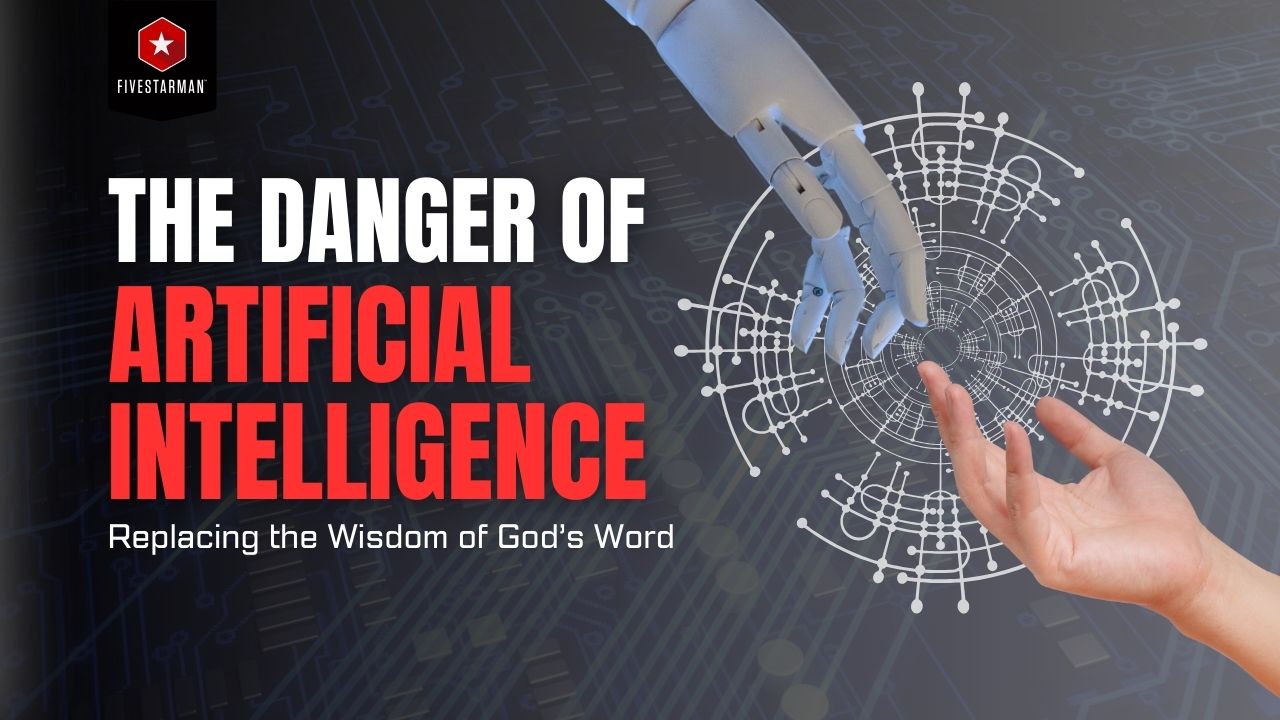Artificial Intelligence vs. the Wisdom of God’s Word

In an age where technology races forward at breakneck speed, artificial intelligence (AI) has emerged as a towering force, reshaping how we live, work, and think. From answering complex questions to automating tasks, AI promises efficiency, insight, and progress. Yet, as we marvel at its capabilities, a timeless question arises: Can the creations of human ingenuity ever rival the eternal wisdom found in the Word of God?
Artificial Intelligence and, soon, Artificial Superintelligence are becoming the advisor, counselor, and unquestionable standard of truth seekers. However, is this wisdom comparable to or combative with the wisdom of God?
As believers, we are called to navigate this modern landscape with discernment, anchoring ourselves in the unchanging Truth of Scripture while engaging with the tools of our time. Let us explore the contrast between AI’s temporal knowledge and the divine wisdom of God’s Word, drawing inspiration from the Bible to guide us in a world captivated by innovation.
The Rise of Artificial Intelligence
Artificial intelligence is a marvel of human achievement. It processes vast amounts of data, predicts outcomes, and even mimics human conversation with startling accuracy. Businesses leverage AI to optimize operations, doctors use it to diagnose diseases, and individuals rely on it for everything from navigation to entertainment. Its allure lies in its ability to provide quick answers and solve problems with precision. In many ways, AI reflects humanity’s God-given creativity, as we are made in the image of a Creator who spoke the universe into existence (Genesis 1:27).
Yet, for all its brilliance, AI is inherently limited. It is a tool, not a source of truth. Its “intelligence” is derived from human input—data curated, coded, and constrained by finite minds. AI can analyze patterns, but it cannot discern eternal purpose. It can offer solutions, but it cannot impart meaning. As Proverbs 14:12 warns, “There is a way that seems right to a man, but its end is the way to death.” The knowledge AI provides may seem right, even revolutionary, but without divine guidance, it risks leading us astray.
Consider the Tower of Babel (Genesis 11:1–9). Humanity, united in ambition, sought to build a structure reaching the heavens, relying on their collective ingenuity. God, seeing their pride and their refusal to obey the command to cover the entire earth, confused their language and scattered them. AI, like the tower, can become a monument to human self-reliance if we place it above the wisdom of God. It is not the tool itself that poses a danger, but the heart that wields it. As stewards of technology, we must use AI with humility, recognizing its potential while submitting it to the authority of Scripture.
James warns us of the wisdom we should avoid: “Who is wise and understanding among you? Let them show it by their good life, by deeds done in the humility that comes from wisdom. But if you harbor bitter envy and selfish ambition in your hearts, do not boast about it or deny the truth. Such “wisdom” does not come down from heaven but is earthly, unspiritual, demonic. For where you have envy and selfish ambition, there you find disorder and every evil practice.” (James 3:13-16)
The Eternal Wisdom of God’s Word
In contrast to AI’s transient knowledge, the Word of God stands as an unshakable foundation. Psalm 119:89 declares, “Forever, O Lord, your word is firmly fixed in the heavens.” While AI evolves with each update, God’s Word remains constant, its truths enduring across generations. It is not merely a collection of ancient texts but the living, breathing revelation of God’s character, will, and purpose (Hebrews 4:12). The Bible offers not just information but transformation, guiding us toward righteousness and eternal life.
The wisdom of Scripture surpasses human understanding. Proverbs 2:6 reminds us, “For the Lord gives wisdom; from his mouth come knowledge and understanding.” Unlike AI, which draws from human data, God’s wisdom flows from His infinite nature. It addresses not only the “how” of life but the “why,” revealing our purpose as image-bearers called to glorify God and love others (Matthew 22:37–39). When we seek answers, AI may provide facts, but only God’s Word offers truth that anchors the soul.
Take, for example, the story of King Solomon. When faced with the daunting task of ruling Israel, Solomon did not seek advanced tools or human strategies. Instead, he prayed for wisdom, and God granted him discernment unmatched by any (1 Kings 3:9–12). Solomon’s reign flourished because he relied on divine guidance, not merely human intellect. Today, we face complex challenges—ethical dilemmas in technology, cultural shifts, and personal struggles. Like Solomon, we must turn to God’s Word for wisdom that transcends the limitations of algorithms.
Navigating the Tension
The contrast between AI and God’s Word does not mean they are inherently at odds. AI can be a powerful tool for good when used under biblical principles. For instance, churches use technology to spread the Gospel, missionaries translate Scripture with AI-assisted tools, and scholars analyze ancient texts with digital precision. These are modern parallels to the apostles’ use of Roman roads to carry the message of Christ. The issue arises when we elevate AI above its proper place, treating it as a substitute for divine wisdom.
One key difference lies in discernment. AI can process data, but it lacks a moral compass. It may suggest actions based on efficiency or popularity, but it cannot weigh them against God’s standards of righteousness. For example, AI might optimize a business decision that maximizes profit but ignores justice or compassion. In contrast, Micah 6:8 calls us to “do justice, and to love kindness, and to walk humbly with your God.” Only Scripture provides the ethical framework to guide our use of technology.
Another distinction is purpose. AI is designed to serve human goals, but human desires are often fleeting or misguided. James 4:3 warns, “You ask and do not receive, because you ask wrongly, to spend it on your passions.” God’s Word, however, aligns our desires with His eternal plan. It teaches us to seek first the kingdom of God (Matthew 6:33), ensuring our pursuits have lasting significance. As we engage with AI, we must filter its outputs through the lens of Scripture, asking, “Does this glorify God? Does it serve His purposes?”
A Call to Biblical Discernment
So, how do we navigate this tension in a world increasingly shaped by AI? The answer lies in cultivating biblical discernment, rooted in the fear of the Lord. Proverbs 9:10 states, “The fear of the Lord is the beginning of wisdom, and the knowledge of the Holy One is insight.” This reverent awe of God positions us to use AI as a tool, not a master. Here are three practical steps to live this out:
- Anchor Yourself in Scripture. Make the Word of God your primary source of truth. Psalm 119:105 declares, “Your word is a lamp to my feet and a light to my path.” Regular study and meditation on Scripture equip you to evaluate AI’s outputs with clarity. When faced with a decision, ask, “What does the Bible say?” Let its principles guide your actions, whether you’re using AI in business, education, or personal life.
- Pray for Wisdom. James 1:5 promises, “If any of you lacks wisdom, let him ask God, who gives generously to all without reproach, and it will be given him.” Before adopting new technologies or trusting AI’s recommendations, seek God’s guidance. He will provide discernment to use tools wisely and avoid pitfalls. Prayer keeps our hearts aligned with His will, ensuring technology serves His purposes.
- Use AI with Stewardship. God has entrusted us with resources, including technology, to advance His kingdom. Romans 12:1 urges us to present our bodies—and by extension, our tools—as “a living sacrifice, holy and acceptable to God.” Use AI to amplify your impact for good, whether by sharing the Gospel, serving others, or solving problems justly. But always submit its use to God’s authority, guarding against pride or overreliance.
The Ultimate Source of Hope
As we stand at the intersection of human innovation and divine truth, we are not left to wander aimlessly. AI may offer temporary solutions, but only God’s Word provides eternal hope. John 1:1 proclaims, “In the beginning was the Word, and the Word was with God, and the Word was God.” Jesus, the living Word, is the ultimate revelation of God’s wisdom. Through Him, we find not just answers but salvation, not just knowledge but life.
In a world dazzled by AI’s potential, let us fix our eyes on Christ. Hebrews 12:2 calls us to look to Jesus, “the founder and perfecter of our faith.” He is the wisdom of God incarnate (1 Corinthians 1:24), far surpassing any human invention. As we engage with technology, let us do so with boldness, knowing that our ultimate trust lies not in circuits or code but in the One who holds all things together (Colossians 1:17).
Conclusion
Artificial intelligence is a testament to human ingenuity, but it pales in comparison to the wisdom of God’s Word. While AI offers tools to navigate the complexities of life, only Scripture provides the truth that transforms us. As believers, we are called to use technology with discernment, anchoring ourselves in the Bible’s unchanging truth. Let us embrace AI as a servant, not a savior, and let the Word of God be our guide. In doing so, we will shine as lights in a world desperate for hope, pointing others to the eternal wisdom found in Christ alone.
May we, like the Psalmist, declare, “Oh, how I love your law! It is my meditation all the day” (Psalm 119:97). And may our lives reflect the beauty of God’s wisdom, outshining even the brightest achievements of human hands.
Action Step:
Take the 45-Day Challenge at FivestarMan.com to cultivate a disciplined and purposeful mindset. This biblically grounded program will guide you daily to grow in faith, resilience, and leadership. Accept the challenge and become the man God destined you to be!

